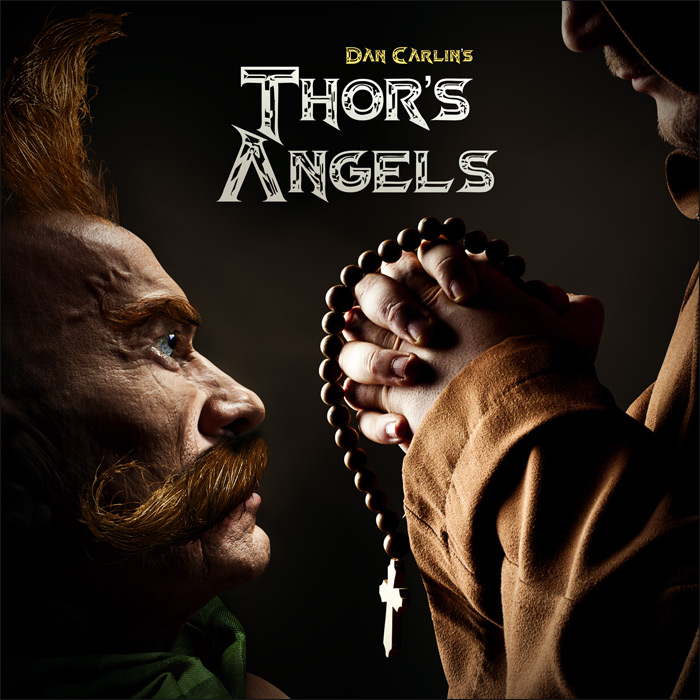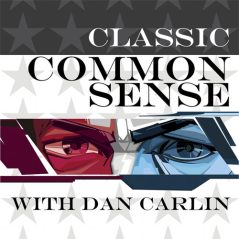Hardcore History 41 – Thor’s Angels
$2.99
What started as a standard podcast episode morphed into an audio book on what used to be called “The Dark Ages” in Europe. Dan gets into many areas he should probably avoid…Gods, Germans, bikers, Jesus…
8 reviews for Hardcore History 41 – Thor’s Angels
You must be logged in to post a review.




















Geoffrey –
Absolutely loved the episode overall. The period after the fall of the Western Roman Empire has always been a favorite of mine and Dan handles it in a very interesting way. The biker gang comparison seemed a little much at times but, hey, sometimes if the shoe fits.
My only little gripe is the description of early Christians as being “unreasonably fanatical” for peace. A group of people standing up for their beliefs, beliefs that were just that, peaceful, even at great personal cost is not, in my view, unreasonably fanatical, but a testament to the strength of personal convictions in the cause of peace. So many in history are remembered for their personal convictions in the cause of war or conquest that calling early Christians “fanatics” seems to diminish them. It’s important to make that distinction of a peaceful religion especially in light of what later Christians became.
kristinecosta –
I love your work, and there were many factors of this that were fascinating, but I have to lower the score because of the dangerous misunderstanding and promotion of early Christianity as a force for peace which promoted intellectualism and knowledge. The Catholic church ceremonies often limited understanding by selectively choosing which works to preserve, adding and modifying texts “preserved,” using languages which relatively few people in society would understand, performing many rituals with their back to the congregation (sounds small, but this was used to limit knowledge of intervention with the god), limiting who could join the clergy, and so much more. Was it better than nothing? Yes. But, that doesn’t say much – esp since some of these practices are still in use. There was some inaccuracies re: the Early Christian church being “fanatics for peace.” Augustine of Hippo advocated for “just war.” St Ambrose of Milan and St. John Chrysostom specifically wanted violence against the Jews. etc Pogroms started very early in the church relatively soon after Christians themselves stopped being persecuted. Miroslav Volf mentions this in Christianity and Violence p13. While for a time there was a consensus that early Christians were completely peaceful, later research by historians and theologians (esp Jewish ones) show this wasn’t necessarily the case – esp related to the Jews. Furthermore, when looking at the actual text of the NT, pacifism is selectively present depending on which of Jesus’ quotes are taken into consideration.
I love your work, but you seem to sway between taking into account what the ancient world was like re: the context of the time while using judgment on more modern history because it informs the way such things currently affect the world. There seems to be a lack of understanding of how much the actions of the church in the past (which often mimic or are very similar to how it is practiced today in non-Western countries) affects the quality of life both individualistically and societally for many people in the world. I original migrated from what is typically called a “third world” country, and the church seems almost as harmful now as it was in the past (violence, discrimination, bigotry, anti-intellectualism, misogyny, exorcisms, participation in genocides [Rwanda most recently], anti-medical interventions, and so much more). I ask for more caution when addressing religious topics esp with what appears to be a Western bias. Catholicism is very de-clawed as its power is significantly reduced in the Western world in comparison to how it is practiced in areas of more limited means.
I really do love your work, though.
Djforce_1 –
Another awesome “audio book”, a great complement to “Death Throes of the Republic”. Dan explains in his unique way how Europe went from the collapse of the Roman Empire to the end of Charlemagne, and how the Catholic church “matured” from a peaceful minority sect to the defacto government of Europe.
Not so much an exploration of a theme as much as a blow by blow, so some have complained it comes across as “…and then this happened”. Well, that’s how history unfolds sometimes. For me it fleshed out a part of history I have always wanted to learn more about.
My only complaint: It stopped after Charlemagne’s children. I wanted it to continue until the modern day, a total history of the German people and the Holy Roman Empire.